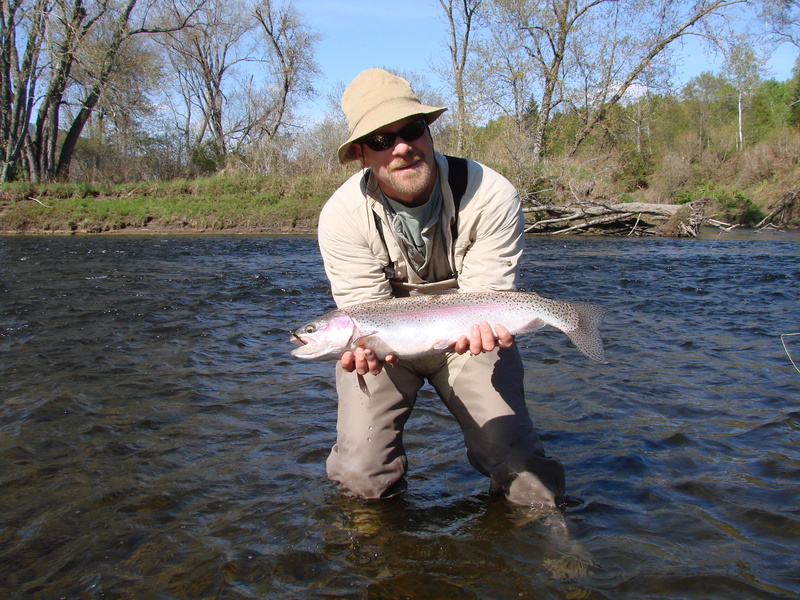They call it fishing porn. And it’s proudly made in Maine.
Moreover, some Mainers think these trendy new documentary-style films on fast fishing and happy fishermen will gain in popularity. These movies are about how to love fishing, not how to fish — and despite the nickname for these videos, they’re wholesome, educational and absolutely geared for kids.
The recent boom in fly-fishing films across the country has taken hold in Maine with at least one cinematographer. And Bethel native Carter Davidson thinks he can make a go at this new niche industry.
“I’m psyched where it’s come the past three years,” said Davidson, who lives in Manchester, N.H., but films much of his footage in Maine. “At the screening last year in Bethel, I had close to 200 (viewers). We’re seeing a full house.”
Open-water fishing opened Thursday after an emergency law was signed by Gov. Baldacci,, Davidson will be celebrating at the public screenings of his third film, “The Good Life,” first in Bangor and then in Brunswick.
These modern fishing films are the fly-fishing version of what you see in the Banff Mountain Film Festival or the Warren Miller snowboard and ski films. They’re about the outdoors, the environment and protecting it.
“The first one came out in 2003 or 2004. It’s fishing porn. It’s solid guys fishing and catching fish with music in the background,” said Jim Bernstein, a guide and manager at Eldredge Bros. Fly Shop in Cape Neddick.
“It’s the Warren Miller films of fishing, that’s kind of how I see it. I grew up skiing and we’d go to places to ski and in the lodge we’d watch those movies. They were funny and exciting. That’s kind of what it is.”
However, unlike the extreme adventure films shown at the 35-year-old Banff Mountain Festival, such fishing films are not produced in 35 countries or shown in 300 locations worldwide. And the prize money at fishing film festivals is more on the order or $400, not $4,000.
The 4-year-old Great Falls Fly Fishing Film Festival in Great Falls, Mont., for example, reserves the right to cancel its annual show for lack of entries.
And the one national fishing film tour has been running just four years, although it now travels to 80 cities in the United States.
Like the Banff films, however, The Fly Fishing Film Tour has the goal of “inspiring filmmakers to create new cutting edge films to both entertain and educate outdoor enthusiasts.”
Maine guide Michael Jones said what the fishing film industry has done well is what the fly-fishing industry needs: recruit younger members. And Jones said nobody does that better than Davidson.
Jones, who was featured in Davidson’s first two films, said while other fly-fishing film producers go to exotic international locations and shoot footage from exclusive lodges Davidson has remained more grass-roots.
His work is done on the East Coast, and much of it in New England. Davidson’s recent movie shows striper fishermen along the Maine coast and fly fishermen on the West Branch of the Penobscot River, as well as on waters around Bangor, Winterport and Rangeley.
He shows blue-collar workers and 20-something fishermen casting along streams, ocean rocks and in boats. He’s even got scenes of 10- and 7-year-old fly fishermen busting out of school to go wet a line.
“A lot of people think of fly-fishing as an elitist sport for older generations who fish with tradition in mind. What the fly-fishing film industry has done is open up the eyes of the general population that it’s not specifically about $3,000 a week trips to a lodge in Montana. It can be done right in Auburn, Maine,” Jones said. “Carter shows people fishing in their own backyard. Mainers have a rich history of fly-fishing locally.”
Bernstein said fly-fishing films have been made since the invention of film, but today’s movies are more about how and where to enjoy it. He sells 18 films at his fly shop and thinks the buzz around fishing films will build.
Although whether fly-fishing films ever fill Portland’s Merrill Auditorium like a Warren Miller film is a big unknown, Bernstein said.
“Probably more people ski than fish,” Bernstein noted. “But I think Carter is different in how he tells a story. He makes it more interesting. And he’s East Coast.”
Davidson’s not quitting. And he is going to give the film industry a go doing it his way.
“Producing fly-fishing films may not necessarily pay all of my bills, but I am committed. And I think because it’s so new, it’s an exciting time. If I had to say, I’m an independent filmmaker first and a guide second,” Davidson said.
Staff Writer Deirdre Fleming can be contacted at 791-6452 or at:
dfleming@pressherald.com
Copy the Story Link
Send questions/comments to the editors.




Success. Please wait for the page to reload. If the page does not reload within 5 seconds, please refresh the page.
Enter your email and password to access comments.
Hi, to comment on stories you must . This profile is in addition to your subscription and website login.
Already have a commenting profile? .
Invalid username/password.
Please check your email to confirm and complete your registration.
Only subscribers are eligible to post comments. Please subscribe or login first for digital access. Here’s why.
Use the form below to reset your password. When you've submitted your account email, we will send an email with a reset code.